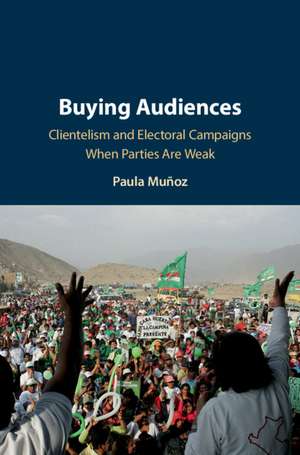Buying Audiences: Clientelism and Electoral Campaigns When Parties Are Weak
Autor Paula Muñozen Limba Engleză Paperback – 19 aug 2020
Preț: 288.42 lei
Nou
Puncte Express: 433
Preț estimativ în valută:
55.20€ • 57.48$ • 46.65£
55.20€ • 57.48$ • 46.65£
Carte tipărită la comandă
Livrare economică 11-25 martie
Preluare comenzi: 021 569.72.76
Specificații
ISBN-13: 9781108435581
ISBN-10: 1108435580
Pagini: 317
Ilustrații: 20 b/w illus. 35 tables
Dimensiuni: 153 x 230 x 20 mm
Greutate: 0.47 kg
Editura: Cambridge University Press
Colecția Cambridge University Press
Locul publicării:New York, United States
ISBN-10: 1108435580
Pagini: 317
Ilustrații: 20 b/w illus. 35 tables
Dimensiuni: 153 x 230 x 20 mm
Greutate: 0.47 kg
Editura: Cambridge University Press
Colecția Cambridge University Press
Locul publicării:New York, United States
Cuprins
1. Introduction; 2. An informational theory of electoral clientelism; 3. Clientelistic linkages in Peru and the limits of conventional explanations; 4. Convoking voters and establishing electoral viability; 5. Influence from the citizens' point of view; 6. Analyzing campaigns; 7. Conclusions; Appendices.
Recenzii
'In this extraordinary book, Muñoz introduces a reconceptualization of clientelism, which will reshape our understanding of electoral behavior in new democracies. Using a multi-method research design that includes survey experiments, focus groups, in-depth interviews, and case study comparisons, Muñoz shows how politicians lacking strong party organizations use handouts to boost their rallies. She then shows that rallies, and not handouts, influence electoral behavior. This book is a 'must-read' for any student of electoral behavior, democracy, and Latin American politics.' M. Victoria Murillo, Columbia University, New York
'Paula Muñoz persuasively shows how clientelism works in the absence of political parties, testing the argument through an impressive and thorough mixed-methods strategy that embeds intensive fieldwork (ethnography, in-depth interviews) and survey experiments in a sub-national comparison. The crisis of political parties elsewhere makes the argument travel widely, well beyond the scope of Peruvian politics. The unusual combination of theoretical scope, methodological sophistication, and substantive relevance make this book an essential reference for the years to come.' Juan Pablo Luna, Instituto de Ciencia Política, Pontificia Universidad Católica de Chile
'Politicians hand out microwaves, cement, and cash, even when they lack strong parties to guarantee that gifts translate into votes. Paula Muñoz provides a highly original account of how politicians provide goods not to buy off voters, but to gain attention from the media, campaign donors, and voters. The rich evidence reveals how vote buying and political campaigning are deeply intertwined in much of the developing world, and how democracy works - with a few extra gifts on the side - without political parties.' Alisha C. Holland, Princeton University, New Jersey
'Paula Muñoz persuasively shows how clientelism works in the absence of political parties, testing the argument through an impressive and thorough mixed-methods strategy that embeds intensive fieldwork (ethnography, in-depth interviews) and survey experiments in a sub-national comparison. The crisis of political parties elsewhere makes the argument travel widely, well beyond the scope of Peruvian politics. The unusual combination of theoretical scope, methodological sophistication, and substantive relevance make this book an essential reference for the years to come.' Juan Pablo Luna, Instituto de Ciencia Política, Pontificia Universidad Católica de Chile
'Politicians hand out microwaves, cement, and cash, even when they lack strong parties to guarantee that gifts translate into votes. Paula Muñoz provides a highly original account of how politicians provide goods not to buy off voters, but to gain attention from the media, campaign donors, and voters. The rich evidence reveals how vote buying and political campaigning are deeply intertwined in much of the developing world, and how democracy works - with a few extra gifts on the side - without political parties.' Alisha C. Holland, Princeton University, New Jersey
Notă biografică
Descriere
Develops a new theory of how politicians campaign and deploy electoral clientelism in weak party systems.
